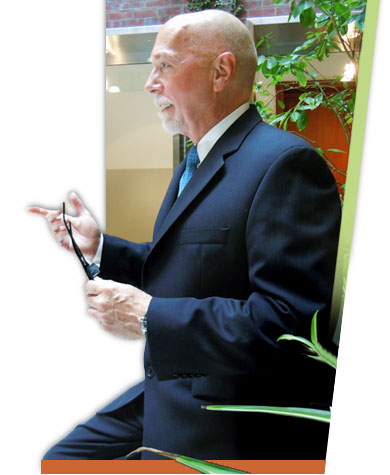
"Creating a motivating vision for the organization, communicating effectively
with different types of individuals, identifying and working with others
who have complimentary, but sometimes very different skill sets, resolving
conflict in teams, mobilizing individual commitment to change or innovation
are just a few areas where his assistance is requested and proven invaluable."

1 | INDIVIDUAL LEADERSHIP COACHING
Bob Wilson’s clinical background has lead to his working with individuals
in the identification and development of talents and skills in the “people”
or “soft skills” aspects of Leadership. Creating a motivating vision for
the organization, communicating effectively with different types of individuals,
identifying and working with others who have complimentary, but sometimes
very different skill sets, resolving conflict in teams, mobilizing individual
commitment to change or innovation are just a few areas where his assistance
is requested and proven invaluable.
(Back To Top)
2 | NAVIGATING BUSINESS CONVERSATION
The ability to navigate effective BUSINESS CONVERSATIONS is critical to the
career success of any manager/leader today. In this context, a conversation
is defined as whenever two or more people gather to discuss a topic for which
there needs to be some type of agreement, decision or conclusion in order
to effectively further the work of the organization. By this definition,
a meeting may consist of several conversations each with a different expected
outcome.
Navigating Business Conversations is a program designed for managers and leaders
to develop the necessary skills for conducting such conversations and the
meetings in which they often occur. At the conclusion of the Program participants
will have:
- Behavioral processes and a mindset for creating collaborative ownership of the topic / issue at hand
- Tools required for engaging self and others in meaningful, focused conversation
- A structured process for creating deliberate results-oriented agendas
- An ability to write clear, concise, meaningful meeting objectives
- A deliberate methodology for building agreements among meeting/conversation
participants
(Back To Top)
3 | LEADERSHIP FOR ORGANIZATIONAL
CHANGE
Market Instability, speed-to-market competition, corporate mergers and "right
sizing", are just a few of the overwhelming forces creating a need for Organizational
Change today. Much has been written about how the success of a business is
directly tied to leadership’s ability to lead change and quickly adapt. In
that light, the ability to lead a business unit/department through a significant
organizational change is critical to both the organization’s success and
the career success of any manager/leader today.
Acknowledging that an organization’s Leadership Competency Model creates the
core platform for leadership development, it is important to recognize that
there are specific Principles unique to small and large scale organizational
change which must be addressed by a leader with deliberateness and applied
discipline.
Leadership for Organizational Change is a program designed for managers and
leaders to focus their attention and skill development for addressing the
critical few Principles of Organizational Change. These Principles are presented
in the form of a Change Acceptance Process (CAP) model which is born out
of more than 20 years direct testing and application in large organizational
change initiatives.
(Back To Top)
4 | UTILIZING THE MEYERS-BRIGGS TYPE
INDICATOR (MBTI) INSTRUMENT
The Myers-Briggs Type Indicator Instrument is a valuable self-report questionnaire
based on the psychological work of Carl Jung. The results identify particular
in-born personality traits that are important in shaping individual talents
and skills. Taking the inventory and understanding its application can bring
significant enlightenment to individuals and team members about how to understand
individual differences, how to work and communicate more effectively, and
how to bring out the best in others.
Bob Wilson is a certified MBTI trainer who can administer and interpret the
instrument and present workshops on the following topics.
- Self development and reflection work (coaching)
- Leadership Development
- Improving Communication
- Team Development
- Conflict Resolution
- Team Problem Solving
- Enhancing Training and Education
(Back To Top)
|

